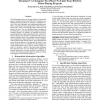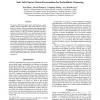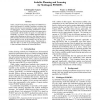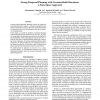AAAI
2015
8 years 8 months ago
2015
We examine the quality of social choice mechanisms using a utilitarian view, in which all of the agents have costs for each of the possible alternatives. While these underlying co...
AAAI
2015
8 years 8 months ago
2015
Model-based approaches provide a semantically well justified way to revise ontologies. However, in general, model-based revision operators are limited due to lack of efficient a...
AAAI
2015
8 years 8 months ago
2015
The leading approach for solving large imperfect-information games is automated abstraction followed by running an equilibrium-finding algorithm. We introduce a distributed versi...
AAAI
2015
8 years 8 months ago
2015
AAAI
2015
8 years 8 months ago
2015
We propose SoF (Soft-cluster matrix Factorization), a probabilistic clustering algorithm which softly assigns each data point into clusters. Unlike model-based clustering algorith...
AAAI
2015
8 years 8 months ago
2015
Online, sample-based planning algorithms for POMDPs have shown great promise in scaling to problems with large state spaces, but they become intractable for large action and obser...
AAAI
2015
8 years 8 months ago
2015
Energy consumption in commercial and educational buildings is impacted by group activities such as meetings, workshops, classes and exams, and can be reduced by scheduling these a...
AAAI
2015
8 years 8 months ago
2015
In many practical domains, planning systems are required to reason about durative actions. A common assumption in the literature is that the executor is allowed to decide the dura...
AAAI
2015
8 years 8 months ago
2015
Effectively incorporating external advice is an important problem in reinforcement learning, especially as it moves into the real world. Potential-based reward shaping is a way to...
AAAI
2015
8 years 8 months ago
2015
Modern technical devices are often too complex for many users to be able to use them to their full extent. Based on planning technology, we are able to provide advanced user assis...




